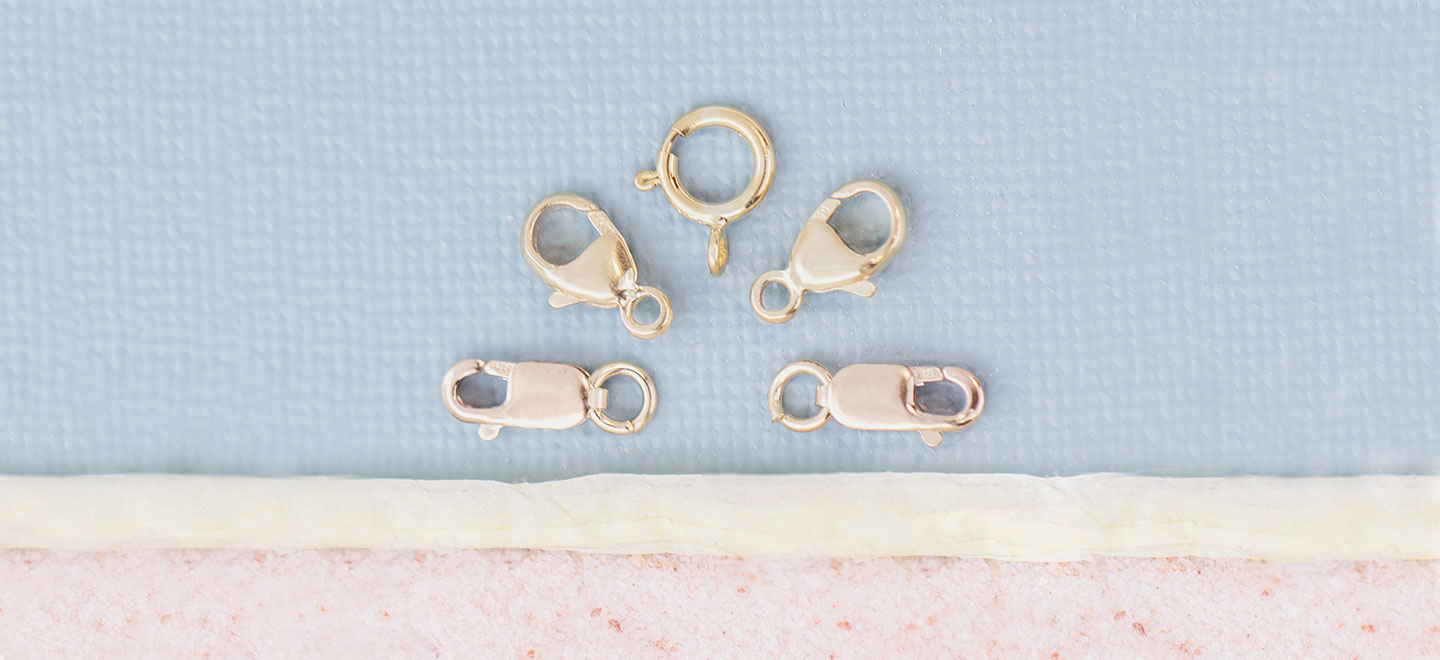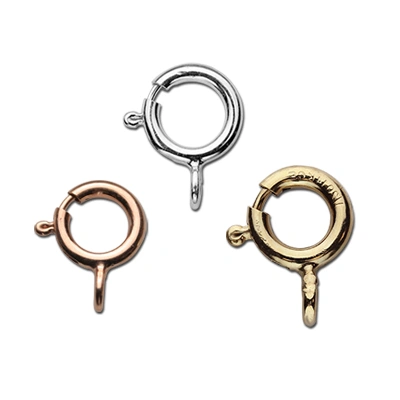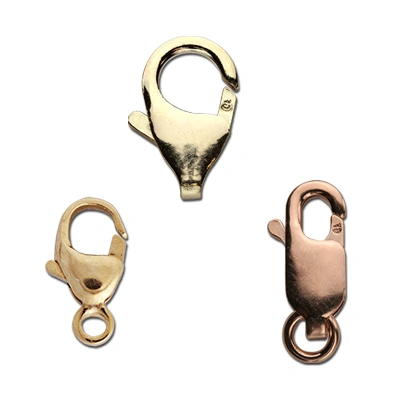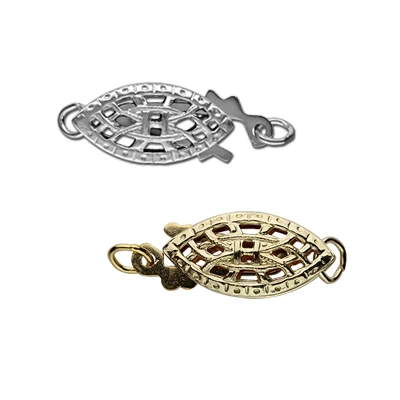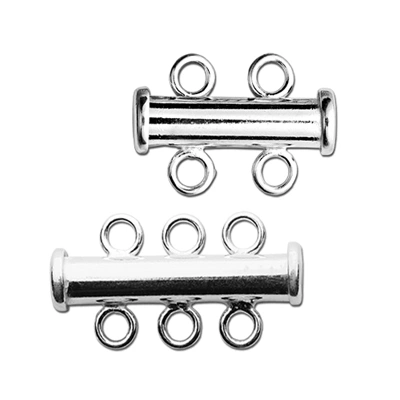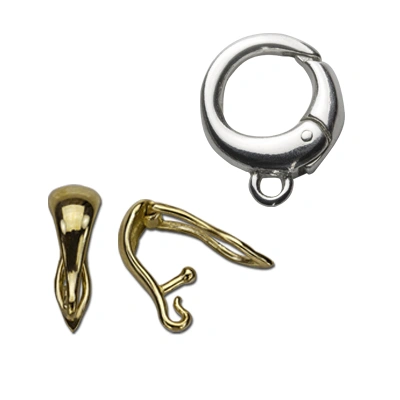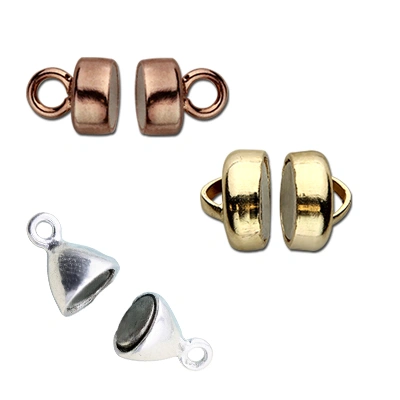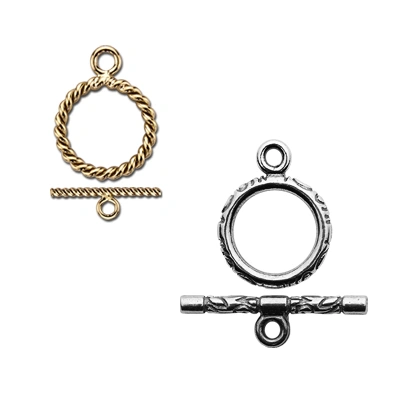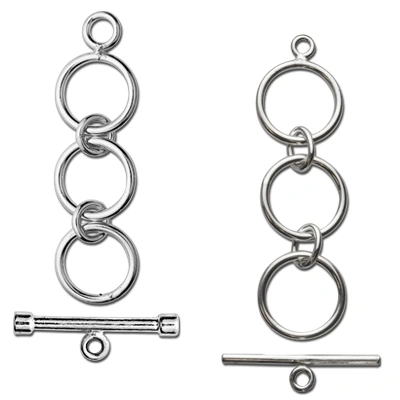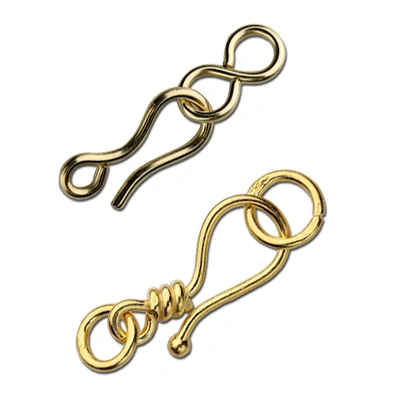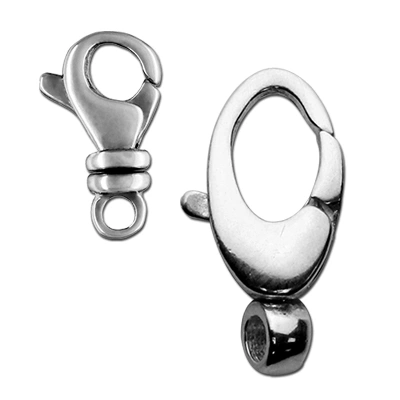Read our guide on types of jewelry clasps and closures popular in today's modern day necklace and bracelet designs. Choose the best clasp for each design with this helpful glossary of terms.
Jewelry clasps and closures are necessary components for most necklaces, bracelets, and anklets. Choosing the right type of clasp is important for customer satisfaction. Here is a glossary of the different jewelry clasp styles and how each one functions. Note that the types of bracelet clasps and types of necklace clasps are basically the same. However, you will want to match the size and weight of the clasp to the piece of jewelry. Heavier items need sturdier clasps.
Spring Ring Clasps
Created in the early 1900s, spring rings have been a staple in necklaces and bracelets for years. These findings use a steel spring-loaded mechanism that works when pressure is applied to the latch. Spring rings are economically priced and best used with lightweight jewelry chains with minimal embellishments. They are also popular with charms as they can be used to snap a removable charm on and off with ease. Large, heavy spring rings are often called Bolt Rings. Learn more about this type of clasp in our article: All About Spring Rings.
Lobster Clasps
Much like the spring rings shown above, these closures feature a steel spring-loaded mechanism that is activated when pressure is applied to the latch. You can find trigger, oval and fancy shapes and just like their namesake they all have a strong grip! Lobster claws are most popular on chain necklaces or bead work. They are easier to operate for most people and generally more popular with end-users. This type of clasp is sturdy and strong for larger pieces of jewelry. Learn more about these clasps in our in-depth article: All About Lobster Claw Clasps.
The earliest known form of a jewelry clasp was created in the late 1700s and resembled the modern-day safety clasp. It consists of two pieces, one that features a spring lock mechanism that slides into a slotted groove located on the second piece. There are a number of variations on this style such as box clasps, pearl clasps, and filigree clasps. They typically hook around a stopper bar or have a pinch activated pull tab so the clasp cannot be accidentally opened. These latches are often more expensive and decorative. So, they are often used on higher-end jewelry items.
Tube ClaspsTube clasps are used for jewelry pieces that have multiple strands. They consist of two hollow tubes with rings soldered on each of the tubes. To secure them you simply slide one into the other. They function well on both necklaces and bracelets.
Enhancers or ShortenersAlso referred to as enhancers, hinged closures can be used for multiple purposes. As a chain-link shortener, gather together large links at the end of the necklace and secure them in the clasp thus shortening it. They can also be used as an enhancer to add removable charms to a piece. These tend to be heavy-duty and lock in place with a hinged clasp.
Magnetic Clasps
I love magnets! These clasps are easy to use but they definitely require a small tug to pull apart. Make sure to use them on jewelry pieces with strong connections so you don't accidentally break a necklace or bracelet. Customers demand that jewelers use magnet clasps more and more often due to frustration with small latches and mechanisms on other clasp types. Magnetic clasps tend to be on the heavy side, so it's important to make sure that they aren't the heaviest item on a finished piece or they will always wiggle their way to the front, bottom point on the necklace. Balance the weight of your design and you will be pleased with results.
Toggle Clasps
Found in higher-end jewelry pieces, toggles are fancy and easy to use. These types of clasps consist of two pieces that fit into one another. One is always a bar but the other piece can be any type of roundish shape but usually is a ring. These are usually on the heavier side of closures. They are perfect hidden or as a focal point. Toggles are a popular choice for charm bracelets because they are easy to operate with one hand.
Extender togglesThese are toggles that consist of multiple links. They are used to extend necklaces to different lengths to give the wearer more options.
Hook & Eye Clasps
Ranging from lightweight to heavy and plain to fancy, hook and eye sets are a favorite closure to use in jewelry designs. It's a hook that latches through a ring which makes it easy to use. These clasps are best for moderate to heavy neckpieces that will keep tension on the clasp since it is not securely latched closed.
Swivel ClaspsThese have all of the features of a standard lobster claw except they have the added benefit of swiveling, too. Your piece is secure while the base swivels at a complete 360 degrees so your necklace does not twist or kink.
About Halstead
Halstead is one of North America's leading distributors of quality jewelry supplies. Halstead specializes in wholesale findings such as jewelry clasps, chain, and metal for jewelry artists.
Halstead is proud to offer quality jewelry supplies, exceptional customer service, and resources. But don't take it from us, hear what customers are saying about Halstead!
You may be interested in our other jewelry vocabulary glossaries:
Types of Jewelry Chain Link Styles
Guide to Different Types of Earring Findings




